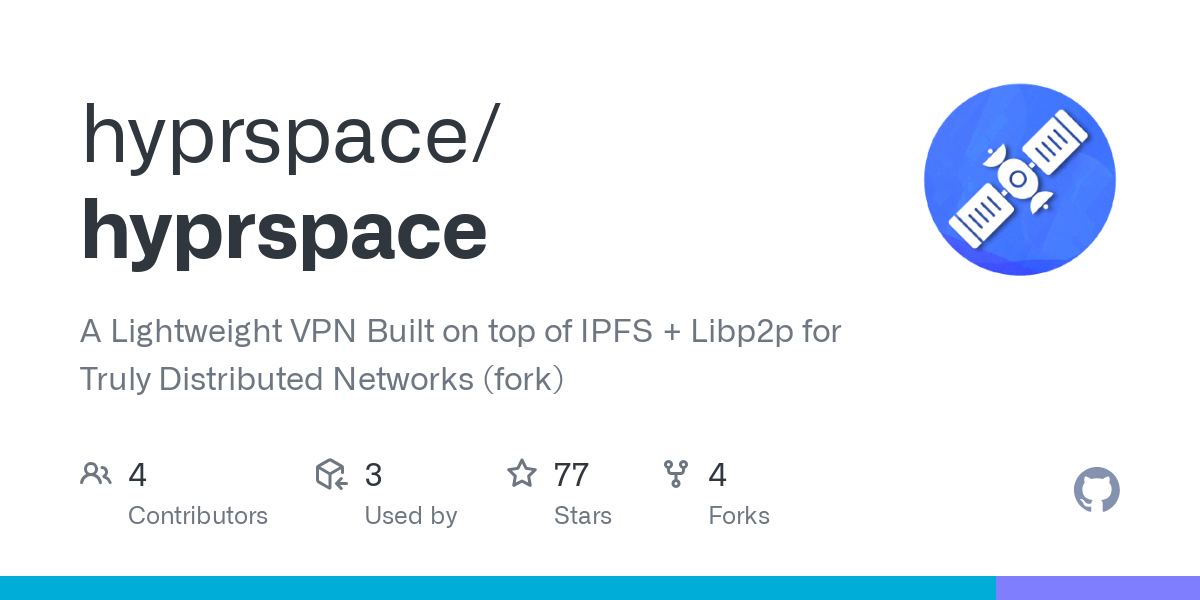I never could get Nix working but maybe someone will
Isn’t that same as Tor?
Not in the least
Wireguard is p2p.
EDIT: I guess the point is it’s doing peer discovery without static public IPs or DNS. Pretty cool!
Or port forwarding. You have to open a udp port for wireguard
Technically you can nat punch with wire guard
How do I learn this power? Don’t you still need at least one server exposed?
Afaik you need some external resource to coordinate the punch. The STUN protocol is purpose built for this, and both clients need to be able to reach a STUN server to coordinate which port and public IP they’ll try to connect to each other on. I assume this does something similar but with p2p network tech instead of a STUN server.
Is this made by the same guy who does hyprland?
YAML?? (╯°□°)╯︵ ┻━┻)
what: is: your: - problem - with: YAML # At least you can have comments unlike in json. Who need comments in a config file anyway.Hey did you know that any JSON file is also a valid YAML file? I bet you’ll love YAML a lot more now that you have this information
Toml is superior to all.
Careful. The yaml cult will come after you in a long and formless column, and only self destruct when one of them is a step too far to the left.
Interesting, it’s on AUR, I will try it.
So it doesn’t need any port forwarding, and works on CGNAT? How the “NAT hole punching” works? Both clients connect to something on IPFS?
Afaik, for DHT with torrent, clients need to know at least one tracker, what is the “tracker” here? Something on IPFS? Who am I sending my IP addresses?
How much overhead does this add to speed? I love with Wireguard, that it’s barely noticeable, really close to p2p speeds, OpenVPN was awful in this regard.
The PKGBUILD looks like it is just building via go. I’m not sure how you would configure it without Nix. I’ll try building it.
Nix just calls the *.nix files, it’s still go under the hood. PKGBUILD is similar to the flake.nix and package.nix files to me, but I have no experience with nix.
First off great find. I didn’t think to check the AUR. I personally wouldn’t use it as that version is 3 years out of date but its existence means that it might be entirely possible to get a non Nix version. I’m not sure I fully understand why it needs Nix OS but what do I know.
It is all libp2p magic
There have been lots if talks on libp2p and Nat traversal. I suggest you check them out. How it actually works is pretty complex and requires someone more knowledgeable than me to explain. One way it works is that both devices start a TCP connection at the same time which gets the proper ports to open up.
AUR packages ending with"-git" or “-svn” always pull the latest commit from source. The version number means that was the last time the packager had to change something on the PKGBUILD script, not the actual version which would be installed.
Where should I look? Where were these talks? I’m interested.
Edit: I found the whitepaper about hole punching: https://research.protocol.ai/publications/decentralized-hole-punching/
It says it connects to a “Hole Punch Coordination (DCUtR - Direct Connection Upgrade through Relay)”. So for NAT traversal to work, you need a third party, this relay. As I expected. I guess you can self host this, but than you could just host a wireguard server. I guess if you are on a locked down network where you cannot connect to any relay (e.g. how the Chinese Great Firewall works technically they could block it) you can’t initiate a connection behind a NAT.
Nonetheless it seems interesting, but no magic here. Maybe the big difference that the relay servers are distributed, so no central authority to block easily.
This reminds me of nebula although nebula does require a central server to coordinate hosts.
deleted by creator
What about Tailscale? I know it’s Proprietary software, but still.
Tailscale… is not that good. The underlying wireguard is robust, but tailscale control plane is completely proprietary, as well as their DERP servers that it too often uses completely needlessly. They can also block you off from downloading it, updating, or logging in, if you happen to be in a wrong country.
I’m myself looking for an alternative to it, but having trouble finding something I could share with non tech savvy friends while not being as complex on my end as, say, open/strongswan ais. Any suggestions welcome.
Headscale worked for me, but I get the non-tech saavy friends part doesn’t quite jive with it as a solution.
Still, anyone wanna ditch Tailscale and only use it for hosting sites across proxies? Headscale is great.
Yeah I don’t understand how this is different than headscale, but I’m very much not savvy on the pipes and tubes that make the Internet go round. Can anyone explain?
Have you considered having Headscale on a cheap VPS? We are actually doing that and it is pretty capable. IIRC, you can configure not to use the tailscale servers at all, and use your own public VPS for coordination. Bonus point, tailscale hired the Headscale developer and maintainer, and they are allowed to work on Headscale while on their payroll. The team looks very much into FOSS.
Yep. That’s the number one contender. Well right after overriding default DERP’s with my own VPS machines. I’ll definitely try it out over some weekend.
One of my other concerns with this and other solutions suggested is the reliance on wireguard which can be subject to fingerprinting and censorship. Do you happen to know if it’d be possible to swap out Headscale’s implementation of wireguard to amnezia? I’ll have to do my homework anyway, but who knows, maybe there are some pitfalls to avoid.
Oh, never heard of amnezia. Never needed actually. But it looks like a good improvement on Wireguard. I will need a separate setup to test it out and currently I’m away from home with no clue when I will return. If I happen to find anything, I will definitely ping you.
In the HN page you linked many people mentioned v2ray. Have you tried that? How good is it?
I use zerotier personally
https://netbird.io/ maybe?
Tailscale is actually a lot more open than you think. The agents are all foss and there is a self hostable version.
*but relies on IPFS.
Useless.
Why is it useless?
Lol. You checked on IPFS lately? Different times. Different world.
Is IPFS something your family and friends check on regularly? I don’t even know what it is.
Considering your reluctance to give any information about your assertion that such a project using it becomes useless, I’m not sure you know what it is either :P
I haven’t checked it out in years. From my understanding, IPFS aims to be a distributed filesystem that kinda works like Bittorent. If you access a file, you then seed it. Last time I checked it out, the project was jumping on the crypto bandwagon… Just checked out their website now, and don’t know WTF it is.
I sure wonder how this is supposed to function, any explanation anywhere, like a diagram or something?
It relies on libp2p not ipfs. ipfs uses libp2p as its transport
“A Lightweight VPN Built on top of IPFS + Libp2p”
Seems like both at a glance

Tell me what I’m misunderstanding here.











